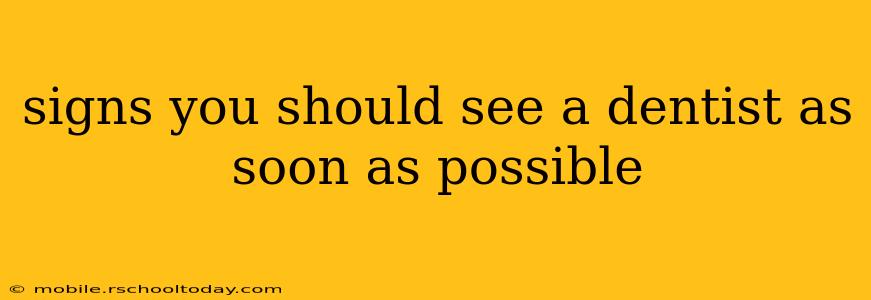Maintaining good oral hygiene is crucial for overall health. However, even with diligent brushing and flossing, problems can arise. Knowing when to seek immediate dental attention can prevent minor issues from escalating into major, and potentially costly, problems. This guide outlines several warning signs that necessitate a prompt visit to your dentist.
Persistent Toothache or Sensitivity
A toothache is a common reason for visiting a dentist, but the severity and persistence of the pain matter. A sharp, throbbing pain that doesn't subside with over-the-counter pain relievers, or sensitivity to hot and cold that lingers, requires professional attention. This could indicate a cavity, an abscessed tooth, or a cracked tooth, all requiring timely intervention to prevent further damage or infection.
Swollen Gums or Bleeding Gums
Inflamed, swollen gums (gingivitis) are often an early sign of gum disease (periodontitis). Bleeding gums during brushing or flossing are also significant warning signs. While occasional bleeding might be due to aggressive brushing, persistent bleeding is a cause for concern. Untreated gum disease can lead to tooth loss, so prompt diagnosis and treatment are vital.
What causes swollen and bleeding gums?
Swollen and bleeding gums are primarily caused by poor oral hygiene, allowing plaque and bacteria to accumulate along the gum line. This buildup triggers inflammation and bleeding. Other contributing factors include hormonal changes, certain medications, and underlying medical conditions.
Loose Teeth or Shifting Teeth
Noticeable movement in your teeth, beyond the normal slight shifting that can occur naturally over time, is a serious issue. This could indicate bone loss due to advanced gum disease or other underlying conditions affecting the supporting structures of your teeth. Immediate dental assessment is crucial to determine the cause and prevent further tooth loss.
Jaw Pain or Clicking Jaw
Experiencing persistent pain in your jaw joint (temporomandibular joint or TMJ) or a clicking or popping sound when you open or close your mouth could signal TMJ disorder. This condition can stem from various factors, including teeth grinding (bruxism), stress, and arthritis. Ignoring TMJ pain can lead to chronic discomfort and potentially more severe complications, so early intervention is key.
How can I tell if my jaw pain is related to my teeth?
Jaw pain related to teeth often accompanies other dental issues such as teeth grinding, misaligned bite, or even impacted wisdom teeth. The pain might radiate from your teeth to your jaw or feel concentrated in the jaw joint itself. Your dentist can help diagnose the exact cause.
Sores or Lumps in Your Mouth That Won't Heal
Any persistent sores or unusual lumps in your mouth that don't heal within a couple of weeks warrant immediate dental attention. These could be indicators of oral cancer or other serious conditions. Early detection significantly improves treatment outcomes, emphasizing the importance of prompt professional evaluation.
Abscess (Pimple-Like Swelling on the Gums)
An abscess is a pocket of pus caused by a bacterial infection, often stemming from an untreated cavity or gum disease. This infection can cause severe pain, swelling, and fever. An abscess requires immediate drainage and treatment with antibiotics to prevent the infection from spreading.
Severe Mouth or Jaw Injury
Following any significant injury to your mouth or jaw, such as a blow to the face or a fractured tooth, seek immediate dental care. Prompt treatment can help prevent complications like infection, nerve damage, or permanent damage to the teeth or jaw.
Persistent Bad Breath (Halitosis)
While occasional bad breath is common, persistent bad breath (halitosis) that isn't relieved by brushing and flossing may point to an underlying dental issue, such as gum disease, a cavity, or dry mouth. A dentist can determine the cause and recommend appropriate treatment.
This information is for general knowledge and does not constitute medical advice. Always consult with a qualified dental professional for diagnosis and treatment of any dental concerns. Early intervention is crucial for maintaining optimal oral health and preventing more serious complications.
